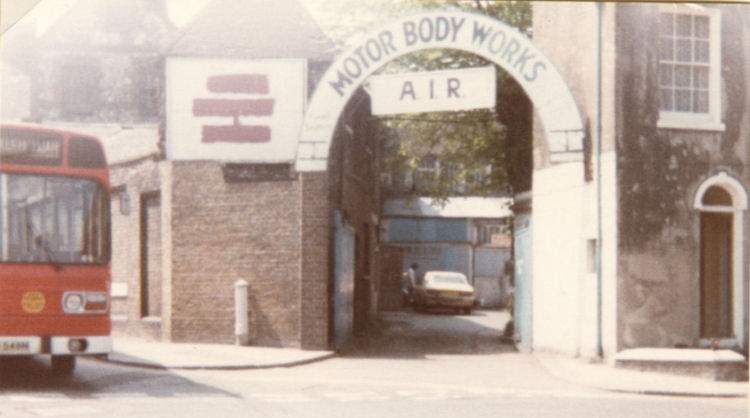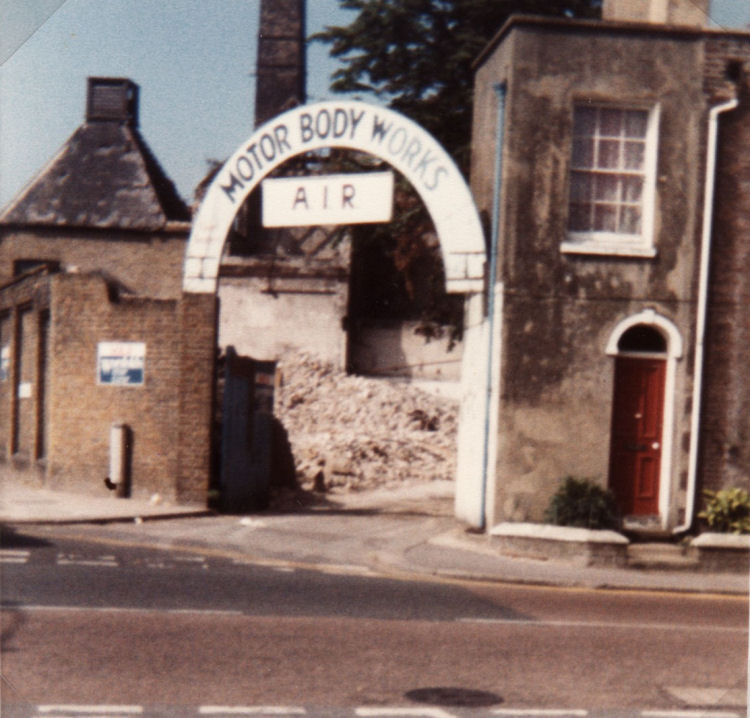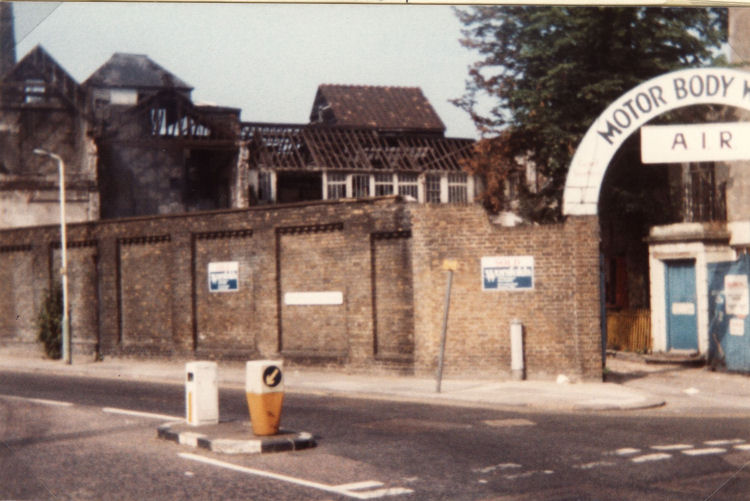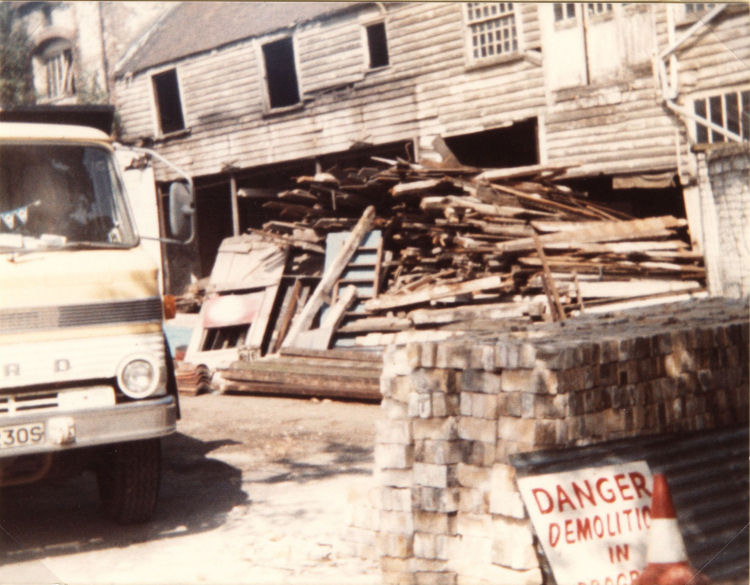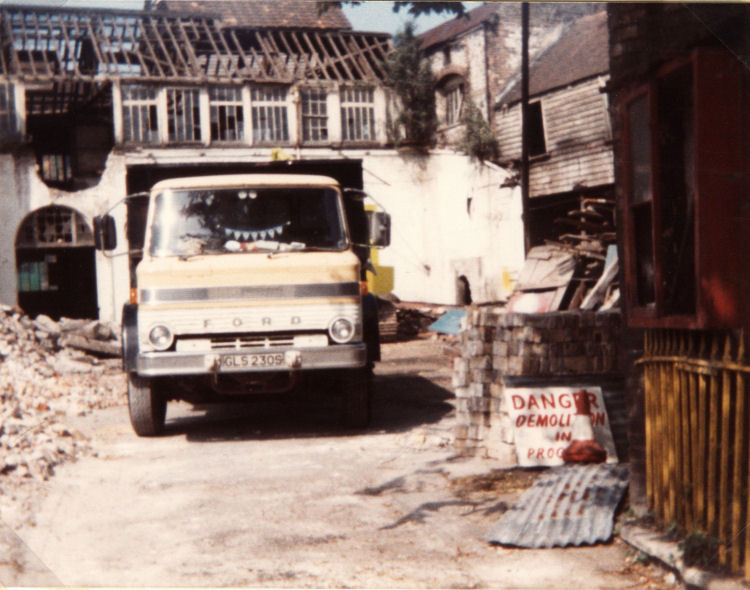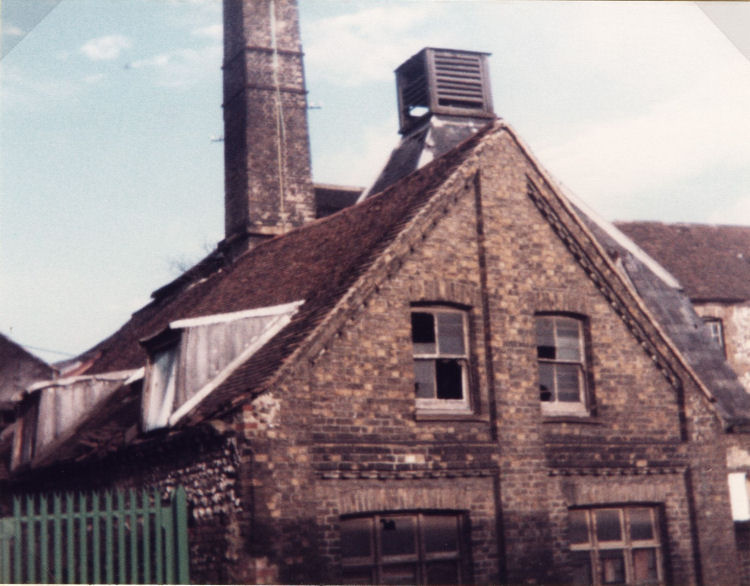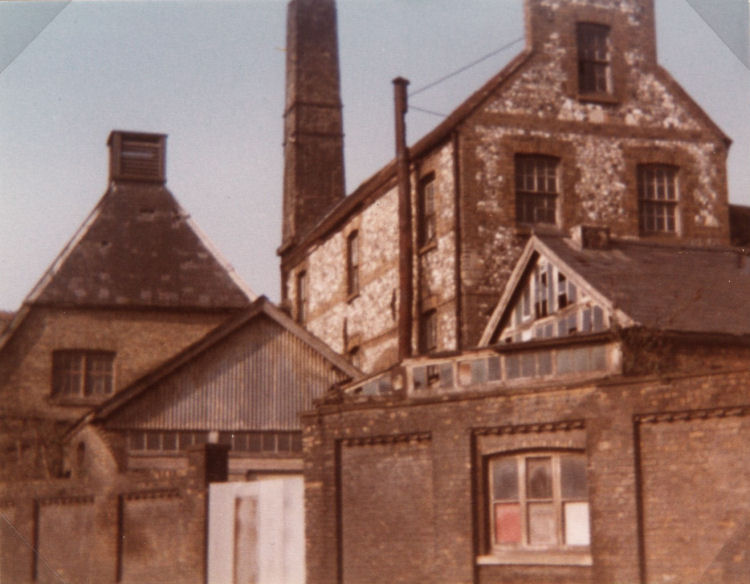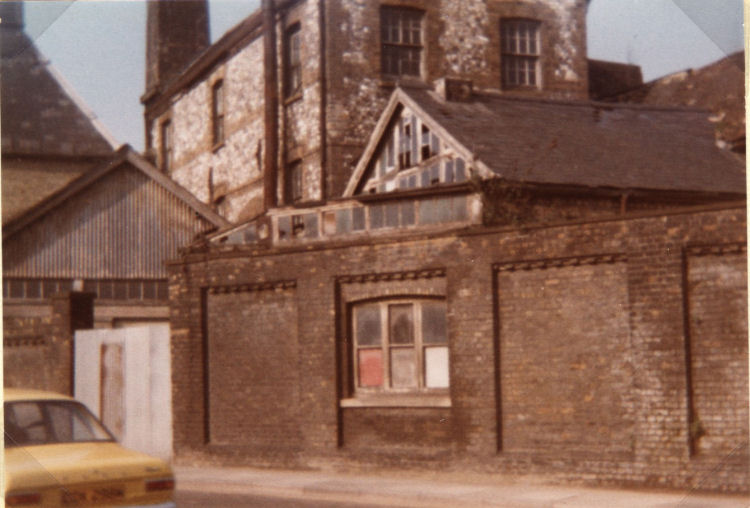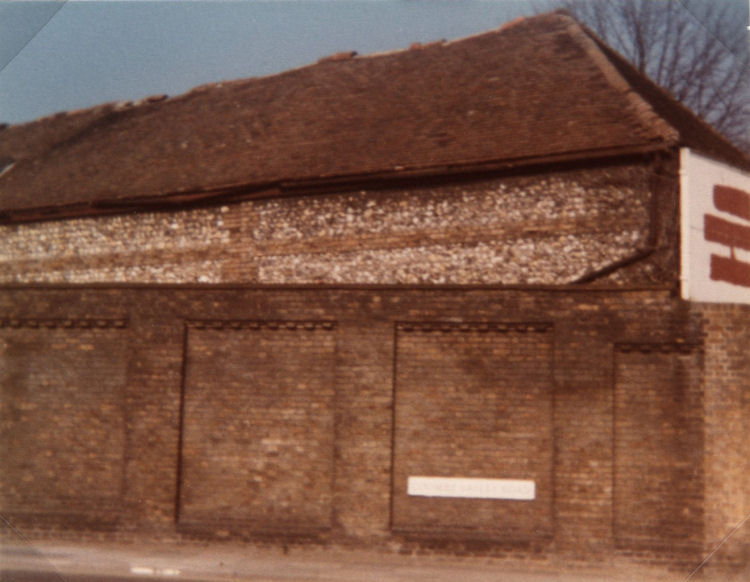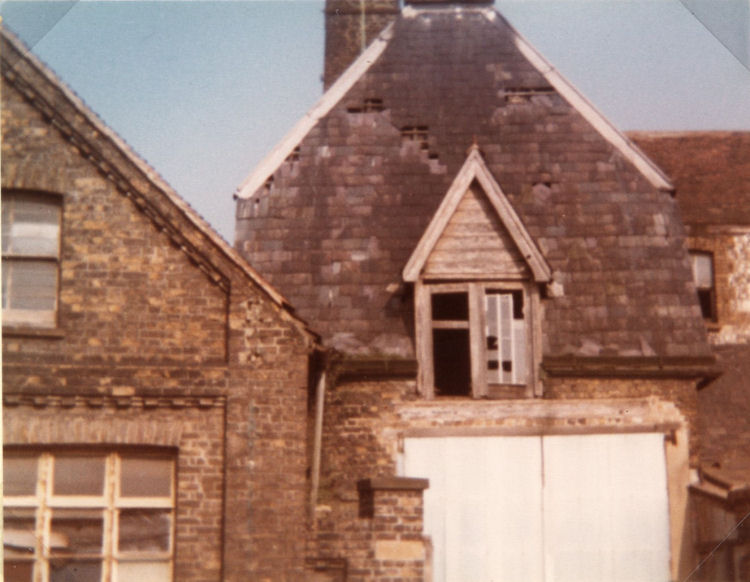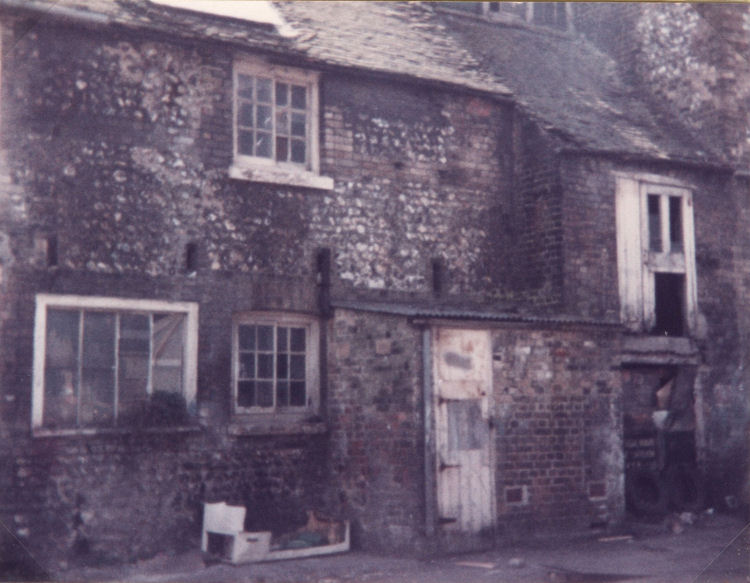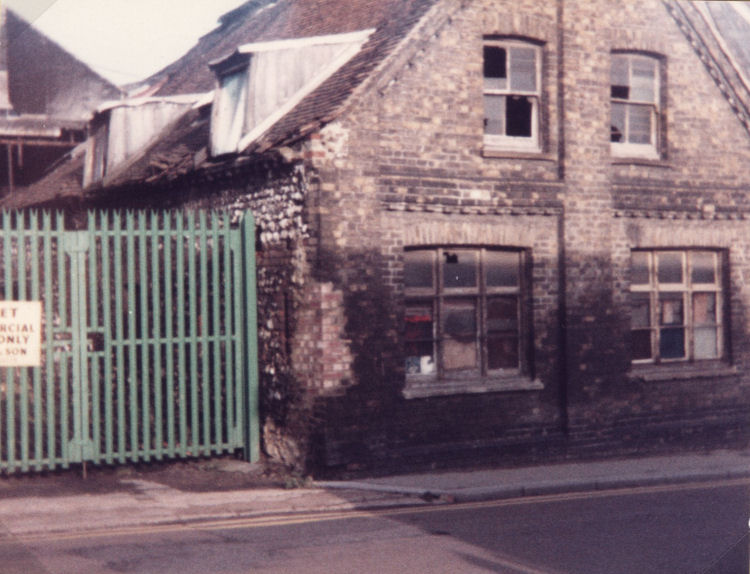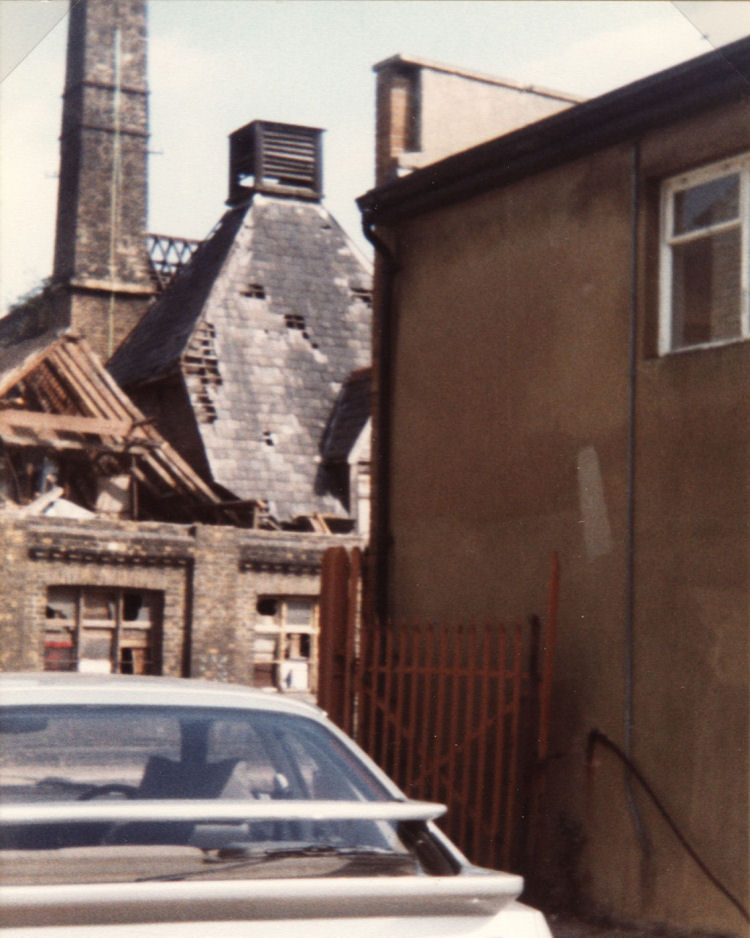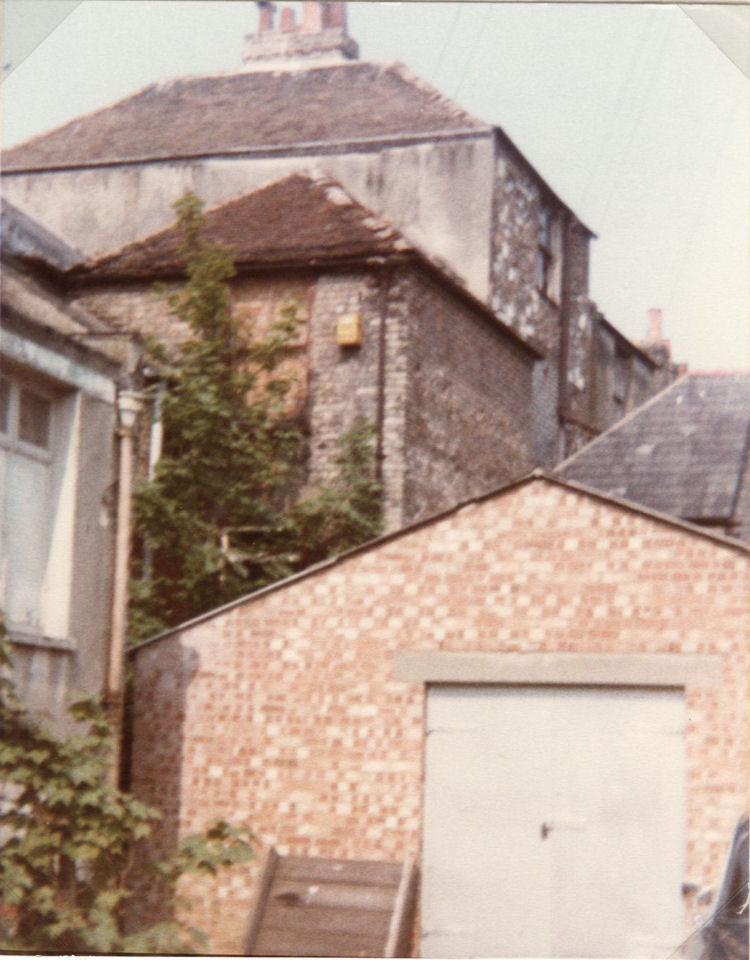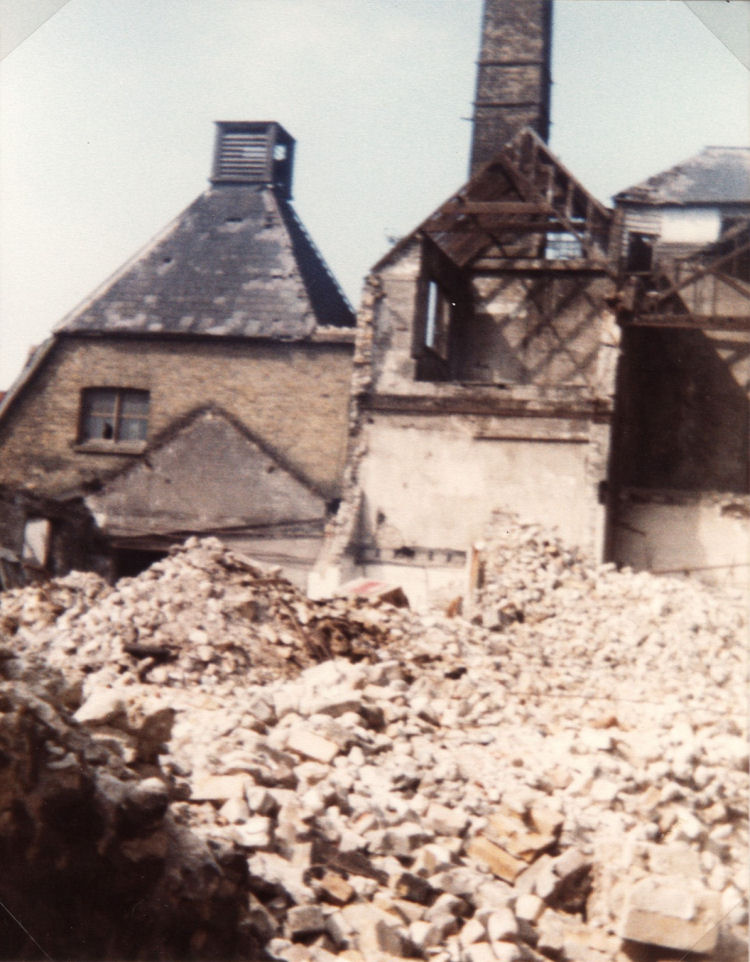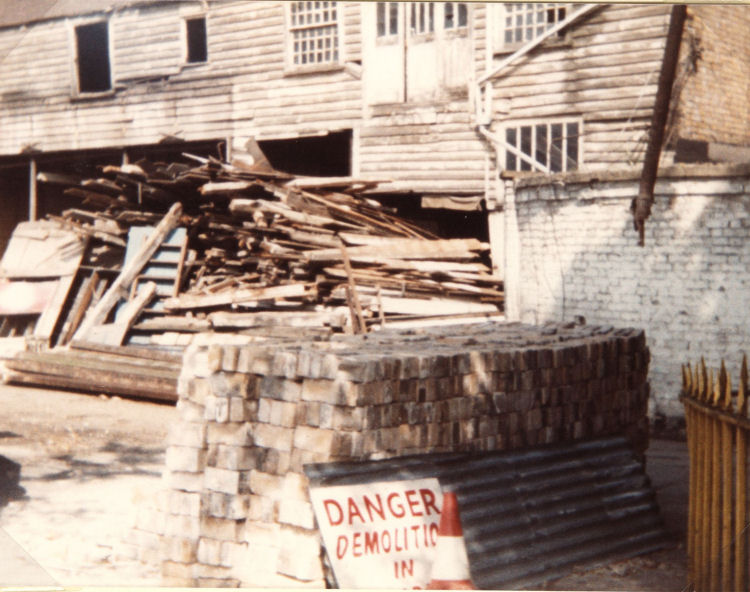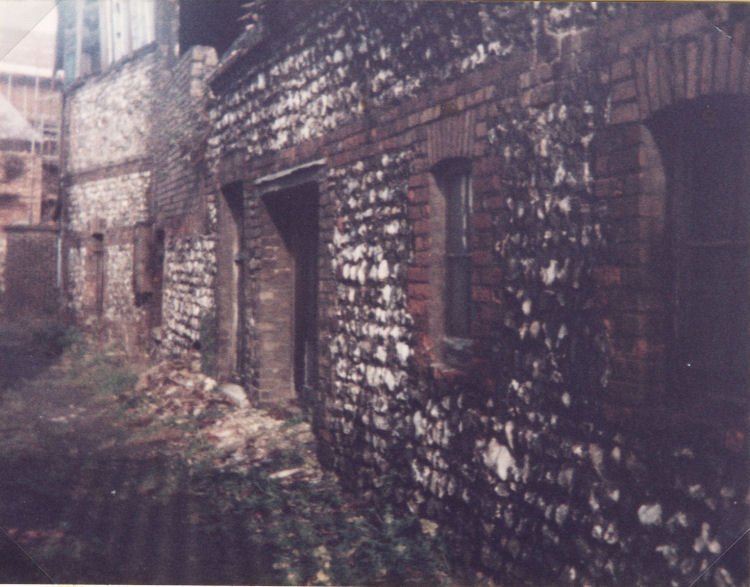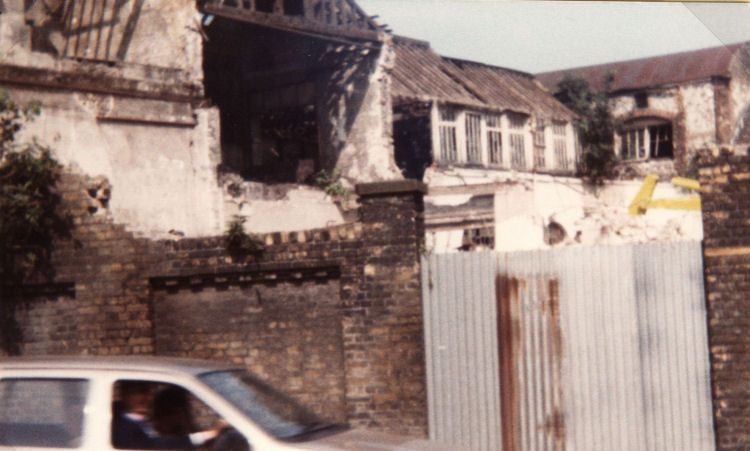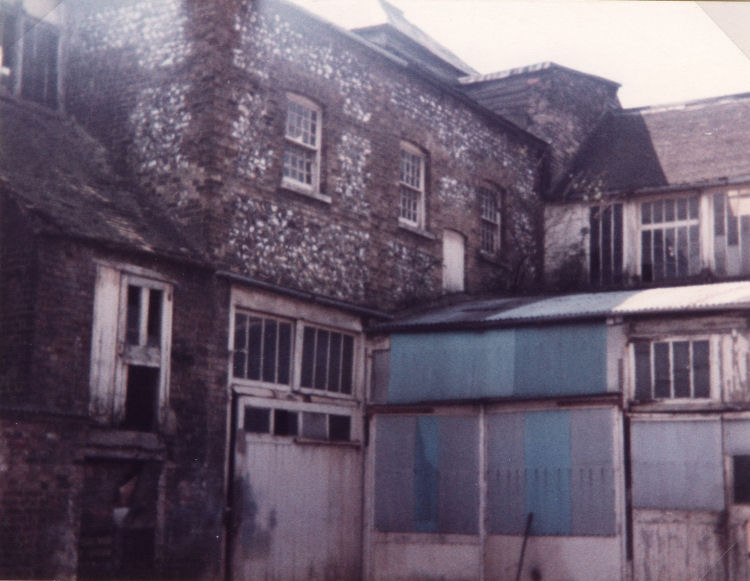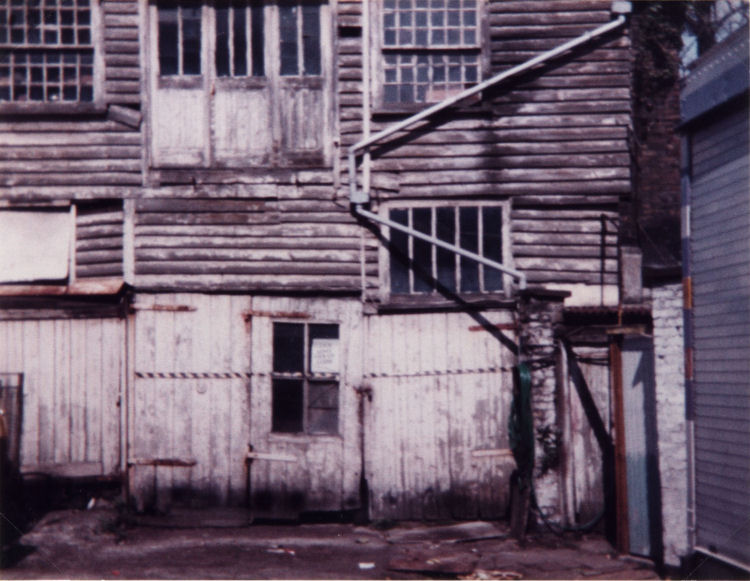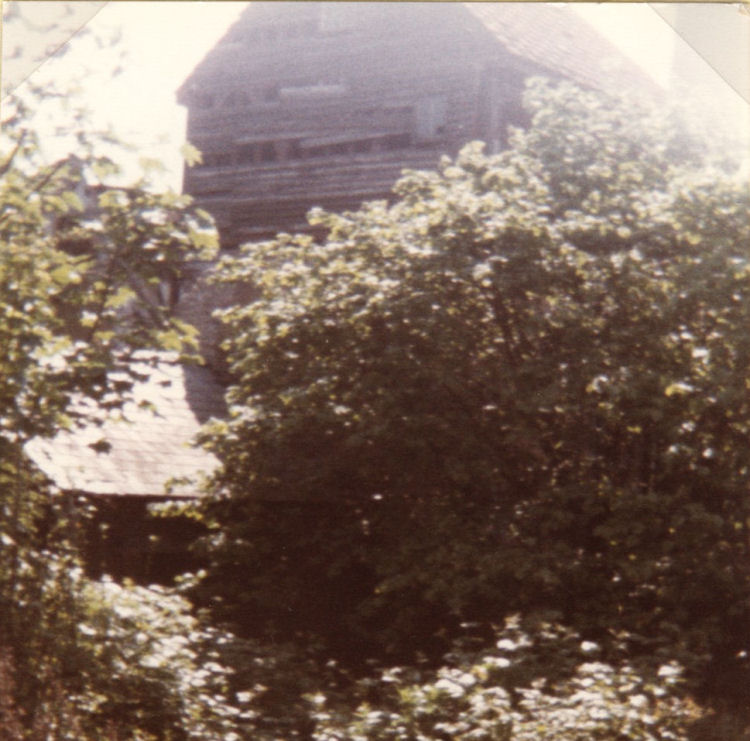|
Union Road.
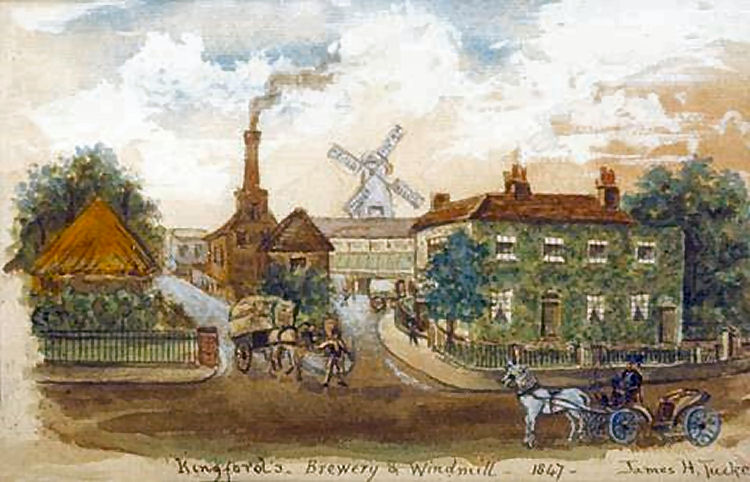 |
|
Site of the Windmill Brewery
From an article in the Dover Mercury 3 October 2002 by Joe Harman.
THIS picture by James Tucker is dated 1847, when James would have been one
year old. So I assume it would have been a copy of another artist's
work.
It shows Kingsford's Windmill Brewery and the name is still remembered in
Kingsford Court flats, which now stand on the site, at the bottom of Coombe
Valley Road.
This picture looks very much how I remembered it before the last war, with
Palmer's coachworks in operation
instead of the brewing of beer.
The windmill had gone, but the base was still
there.
This windmill was built in 1798 and, after 1829, the machinery was
converted to pump water or liquor for the brewery.
The well on the site was rediscovered when the
flats were built there. The house to the right is still there, with a small
addition.
I remember the thatched barn on the left which was destroyed by fire in 1935.
There was a small garden plot with railings which gradually disappeared as
they improved the access to Union Road, as it then was. |
This was at the premises at the corner of Union Road, later renamed
Coombe Valley Road, the premises was later Palmer's and then, until 1978,
Jenkins and Pain's coachworks. Now the site of Kingsford Court Flats.
Alfred Kingsford was mentioned in Pigot's Directory 1832.
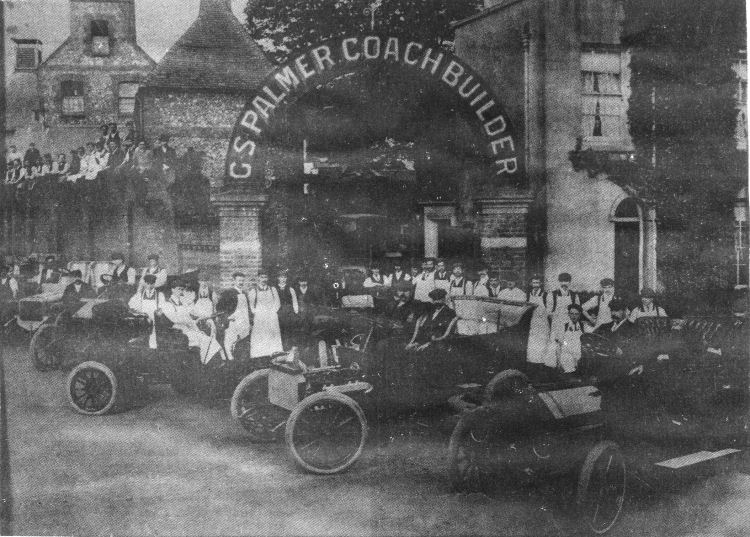 |
|
Above:- A RED letter day for G. S. Palmer and Son, later the Connaught Coach Works and Palmers Limited, with premises in Coombe
Valley Road and Cherry Tree Avenue. The occasion was the securing of a
big order to build car bodies. The date 1908. Mr W. J. PaImer, son
of the founder, obtained an order to build 50 cars based on Peugeot
chassis. These were grouped in the yard and out in the road to be
photographed. Other mementoes of the firm include the first edition
(1923) of a staff magazine, a picture of the coachworks cricket team of
1911 and a photograph of 122 employees of the motor body works staff in
1909.
|
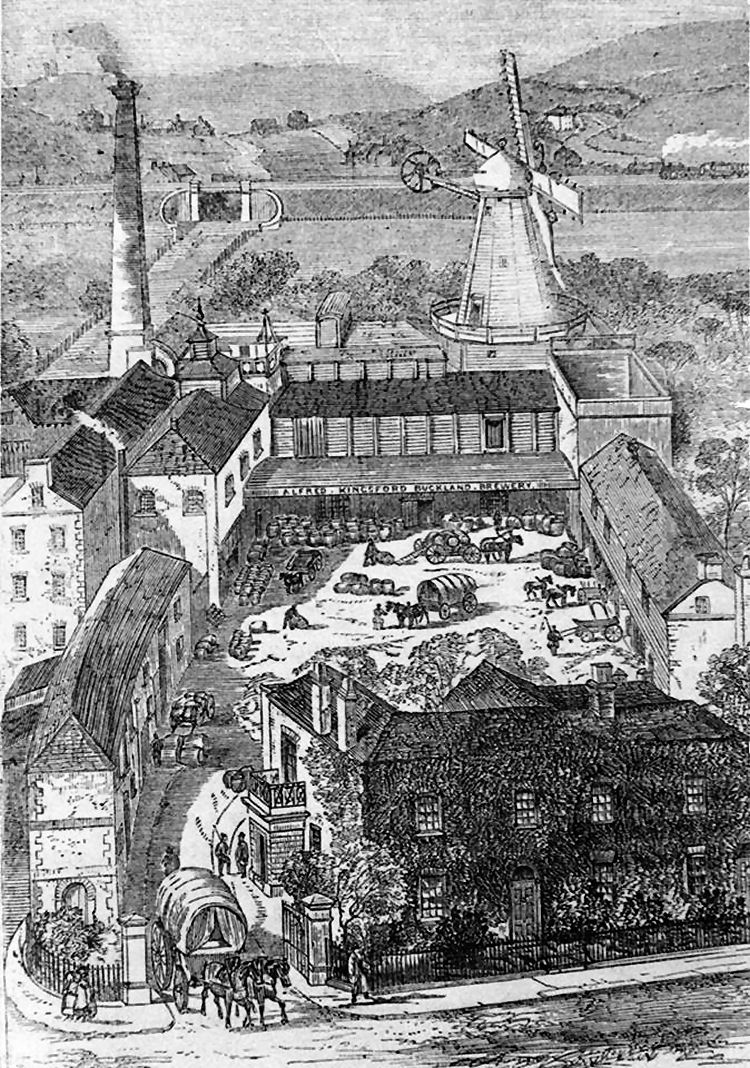 |
|
"Ale is stout and good.
Whether in bottle it be or
wood;
'Tis good at morning. 'Tis good at night;
Ye should drink while
the liquor is bubbling bright;
'Tis good for man, for woman, and child;
Being neither too strong, not yet too mild"
Thus began an appreciation
of Mr Alfred Kingsford's Buckland Brewery in the official South Eastern
Railway Guide of 1863 from which the engraving above is taken. The
brewery was renowned for its light pale bitter ales which doubtless owed
a great deal to the Quality of locally-grown hops, although a great deal
was imported, the malt produced on site and the purity of the water
raised by the windmill- operated pumps from a deep well.
The guide's author wrote in glowing terms of the Buckland Brewery,
its quality light pale bitter ales, which earned accolades from medical
men of high standing and spoke of the magnificent views of the
surrounding countryside from the windmill.
Not much is known about the windmill, which was also used in the
processing of the malt used in making a variety of beers at the brewery,
but there is a reference in an old newspaper to a new mill being built
near the bottom of St Radigund's Road, in April. 1798. The mill was
reputedly demolished in 1863, but a local newspaper records that the
Buckland Cornmill - which need not necessarily have been the same mill -
was offered for sale for £2,200 in 1865 but failed to reach the reserve.
The photograph below, believed to date from the 1890s before Magdala
Road was built on land adjoining, proves that the mill survived until
much later. So far no evidence has been found as to when it was
demolished.
Relics which survive include part of one of the short sweeps and the
stage from which the miller adjusted the shutters on the sweeps. They
were preserved in the remains of the brewery buildings used until
recently as a
car body repair works. Beyond the mill in the engraving a train heads
along an embankment towards the town centre.
Information taken from John Bavington-Jones' book "A Perambulation of
the Town, Port and Fortress of Dover", 1906. (Reprint in The Dover
Express, Friday 20th March, 1981.) |
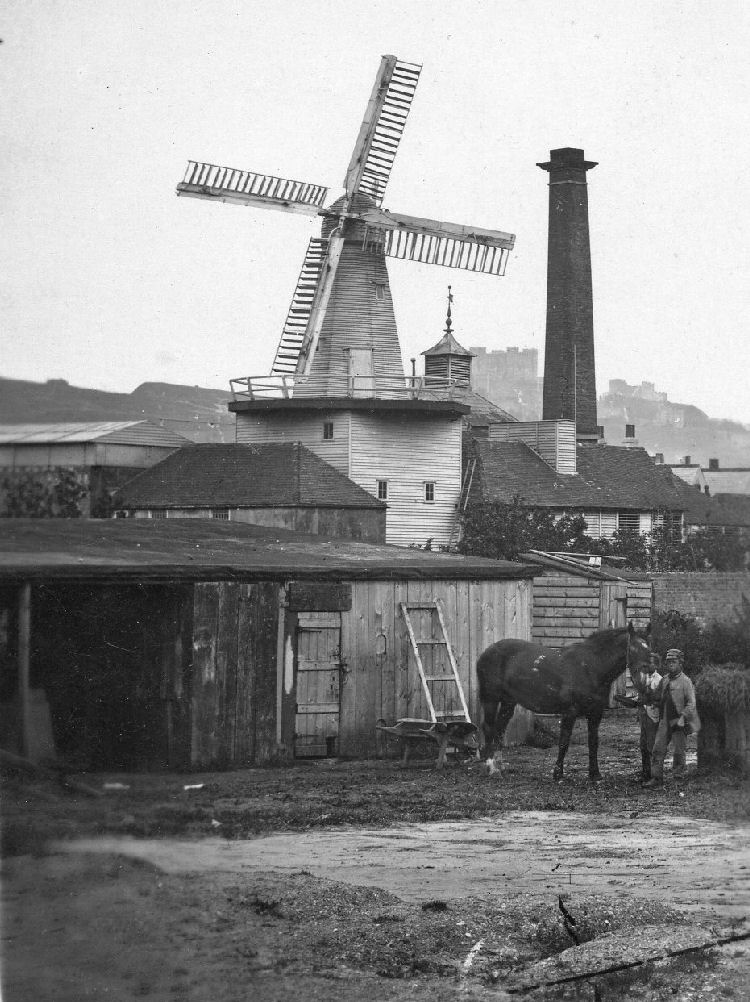 THIS photograph above is of the old Alfred Kingsford
Windmill Brewery at the foot of Coombe Valley Road at the junction with London
Road. The site is now occupied by Kingsford Court flats. Close by is the St
Radigunds Road house in which former ambulance officer Joe Harman has lived
for 86 years. The photograph taken from across the old brickfield at Magdala
Road. by G. T. Amos, is one of the illustrations in Joe's book. "My Dover."
just published. The Express has the original glass plate negative taken about
1865. The full photo is shown down the page. |
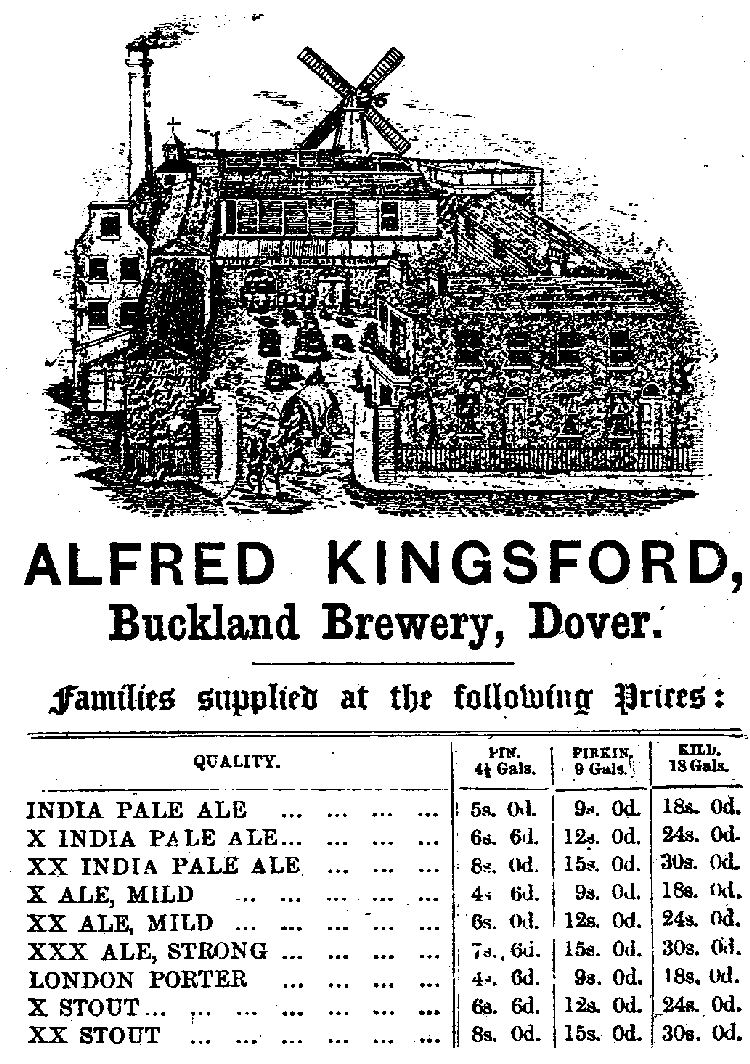 |
|
A Kingsford Brewery advertisement of the 1890's. |
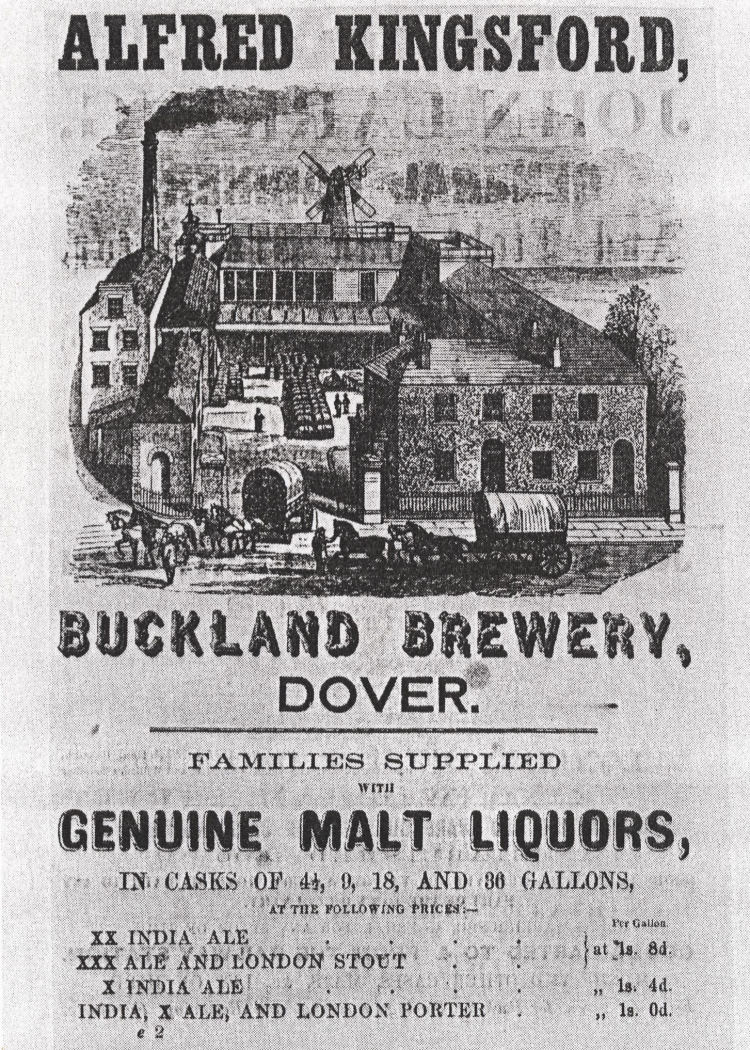 |
|
THE WINDMILL BREWERY AT DOVER
By J.G. Harman
Published in Bygone Kent
The Old Brewery site has now been cleared, and many must have passed
it
by, without realising its interesting history. It stood at the corner of
London Road and Coombe Valley Road at the turning to Buckland Hospital. The Kingsford family have been associated with this area for nearly two
hundred years. William Kingsford the elder bought the St Bartholomew
lands about 1810. These lands belonged to the leper hospital which used
to stand on the hill behind the old Wesleyan Chapel (now a Bingo Hall).
William built the flour mill which still stands, and is now being
repaired. The original mill was on the other side of the river Dour and
had been making paper since 1795 and later became "Hardings Brewery." On
that site we now have some offices used by Townsend Thoresen. To reach
these you cross over the bridge built by William in 1815 as a stone in
the arch signifies. At the moment we are concerned with the Brewery on the other side of the
road. According to Bavington Jones in his book on Dover written in 1907
it was Flavius Ignatious (should read Josephus) who built it in 1829. We
know it was associated with Alfred Kingsford for many years. Pigots
directory of 1826 lists Alfred at Archcliffe Fort Brewery and in 1832 he
is shown as being at Buckland Brewery. He had two sons, one Flavius and
the other Cottenham, who ran the business in later years. They were both
town councillors in 1879. William Kingsford built ‘Lundy House' in 1820
and lived there for some time, probably leaving when he disposed of the
flour mill in 1836. The 1861 Census shows Alfred living in that house,
and earlier we find him in Ivy House which backs on to the Windmill
Brewery. The house still stands although bereft of its ivy. I have not
been too sure about the relationships between the Kingsfords, but I am
inclined to think that they came to Dover in the early 1800s possibly
from Canterbury. The first mention I can find of a Kingsford in the
freeman's Rolls is Edward, who purchased his freedom for £20 in 1802.
This buying of a freedom usually indicates someone coming into the town
to set up in business. Pigot of 1823 lists Edward Kingsford at
Archcliffe Brewery. My great grandfather was a miller following in his
father's footsteps, and they both lived in a cottage belonging to
William Kingsford near the Flour Mill. My grandfather had a brother,
Kingsford Harman and this may show a link. The windmill incorporated in the brewery could have been one built at
Buckland in 1798, and was used for pumping water and not for grinding.
This could have been a factor in siting the brewery on this spot, and
from reports, the well water in this area had a peculiar iron or
chalybeate quality. During the recent demolition, part of the catwalk
appeared attached to the square wooden base. Two of the sails had been
cut down and used as tiebeams when the buildings were modified. Two
portions of cast iron drive shafts have come to light, and they could
have been part of the transmission of power to the water pump. One
wonders why a windmill had been placed there, but we do know that Sir
Thomas Hyde Page lived in the house opposite which has survived amongst
the offices of the DHSS. He owned the St Bartholomew lands, and sold
them to William Kingsford after he left Dover in 1801. Perhaps he might
have built the windmill to improve the view up the Coombe Valley, and
being a military engineer he may have conceived the idea of pumping
water from a well. At that time there was no road loading up through
Buckland Bottom. It was not until the Union was built that Union Road,
now Coombe Valley, came into being. During demolition a brick was found in a flint wall with the initials of
T.H.P. carved in it, and as this was in a boundary wall it could have
connections with Sir Thomas before the brewery was built.
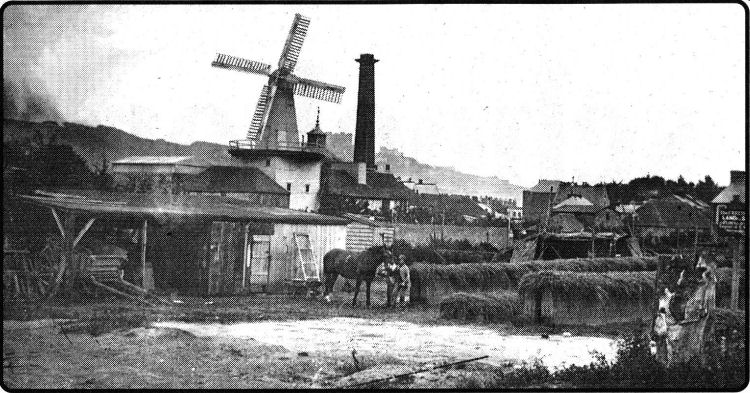
The photograph of the brewery from the North West (above) shows a brickfield in
the foreground and could have been taken about 1865 as Magdala Road was
laid out in 1868 on the site of the brickfield. It is difficult to be
sure when the windmill was taken down but in 1866 we find that
Kingsfords Windmill Brewery opened the "Raglan" in Folkestone. The
boundary wall showing at the back of the brickfield is still in
position. With the assistance of neighbours in Magdala Road I have found
a stone in one of the buttresses with the name of A. KINGSFORD inscribed
but the date below has become eroded. While talking to the demolition team they told me that a bottle had been
found. On investigation it turned out to be a Codds bottle complete with
marble. This had the name Forsters Chemists Dover, and they had a ginger
beer factory, and were listed in Castle Street from the 1880s. I began
to despair of finding evidence of bottling, but one of the workmen said
they had noted two labels when floor timbers were raised. They
apparently were the type put over the stoppers and had the name of
Kingsford printed on them. The brewery seems to have been still operating in 1881 but by 1889 it
appears to have stopped production. One of the photographs taken by W. H.
Boyer of Sandwich 1868-1897 shows the "New Inn" at Sandwich with a board
advertising Kingsfords Dover Fine Ales. About 1890 G. S. Palmer Coachbuilder had taken over the buildings.
According to old directories G. S. Palmer was a wheelwright in Priory
Place. The firm went over to making car bodies and were renowned for
their work, but this is another story. Perhaps someone might be able to
supply the family history of the Kingsfords, and there may be a
collector who has one of their bottles. I know that this is not a
complete story but I felt it was right to record what I have discovered. |
KINGSFORD'S ESTATE
At the beginning of 1834, the estate of the then deceased Mr William
Kingsford, the elder, was being disposed of, as a bankrupt, (see
Bell
Family and Commercial Hotel, Sandwich) and his property on the west
side of the London Road is particularly described as extending from
Bartholomew Terrace up to a 40ft. wide plot adjoining Buckland Brewery,
which was "intended to form an opening into Buckland Bottom." That
definitely fixes the date of the origin of Union Road. The whole of the
roadside land, from the brewery wall down to below where the old Wesleyan
chapel was subsequently built, was put on the market as building land by
Mr
Charles Lamb, auctioneer, in February, 1834. He, however, failed to dispose
of it, and a month later there was a much fuller announcement of the
intended sale of Mr William Kingsford's land on the south side of Buckland
Bottom, comprising over 130 acres, in 31 lots.
|
From the Dover Telegraph and Cinque Ports General
Advertiser, Saturday 4 January 1834. Price 7d.
WHEREAS a Fiat in Bankruptcy
is awarded and issued against WILLIAM KINGSFORD of Buckland, near Dover,
in the County of Kent, paper manufacturer, miller, dealer and chapman,
and being declared a Bankrupt is hereby required to surrender himself to
the commissioners in the said Fait named or the major part of them, on
the sixth day of January next, at one o'clock in the afternoon
precisely, and on the Fourteenth day of February next, at Twelve o'clock
at noon precisely, of the same days, at the "BELL INN", SANDWICH, in the
County of Kent; and make full discovery and disclosure of his Estate and
Effects; when and where the creditors are to come prepared to prove
their debts, at at their first sitting to choose Assigners; and at the
last sitting, the said Bankrupt is required to finish his examination;
and the Creditors are to assent to, or dissent from, the allowance of
his certificate. All persons indebted to the said Bankrupt, or that have
any of his Effects, are not to pay or deliver the same but to whom the
Commissioner shall appoint, but give notice to Mr SURRAGE, Solicitor,
Sandwich; or Messrs. W and E DYNE, Solicitor, 61, Lincoln's Inn Fields,
London.
|
|
From the Dover Telegraph and Cinque Ports' General Advertiser, Friday 18 January, 1834. Price
7d.
BUCKLAND, NEAR DOVER
TO BE SOLD BY AUCTION, BY MR. HARRISSON,
By order of the Assignees of William Kingsford, a Bankrupt, on the
Premises, on Saturday the 25th January 1834, at Ten o Clock in the
Forenoon.
THREE CART HORSES; ONE CHAISE HORSE; Three Cows; One Stack of Clover;
One Stack of Hay; about 2 tons; Fourteen Acres of White and Swedish
Turnips; which will be lotted in half Acres, and may be carted off the
land. Also a large quantity of Building Stones.
Catalogues to be had at the place of Sale, and of the Auctioneer,
Buckland.
|
|
From the Dover Telegraph, Saturday February 1st 1834.
VALUABLE BUILDING LAND, AT BUCKLAND, NEAR DOVER.
TO BE SOLD AT AUCTION, BY
MR. C. LAMB.
At the Antwerp Inn, in Dover, on Tuesday, the 25th day of February,
1834, at Three o'clock in the Afternoon precisely, by order of the
Commissioners, under a Fiat of Bankruptcy against Mr William Kingsford.
ALL THAT VALUABLE PLOT of LAND particularly adapted for the purposes
of Buildings, situate in the parish of Buckland, on the left-hand side
of the Turnpike Road from Dovor to Canterbury, and extending from the
present Houses in Bartholomew Close, to the Farm Buildings of the said
William Kingsford.
The Land will be sold in convenient Lots, as will be expressed in
future advertisements.
Particulars may be had of Mr. Surrage, Solicitor, Sandwich Messrs.
Shipden and Ledger, and Mr. Edward Elwin, Solicitors, Dovor; and of the
Auctioneer, Snargate Street, Dovor.
Dovor, January 30th, 1834.
|
|
From the Dover Telegraph, Saturday February 8th 1834.
Valuable Freehold Mills, Capital, Messuage and Garden, Farm and
Lands, at Buckland, near Dovor.
TO BE SOLD BY AUCTION BY
MR. GEORGE HARRISSON,
At the Royal Oak Inn, Dovor, on Saturday, the 5th March, 1834,
between the hours of One and Three in the afternoon., (by order of the
Commissioners under a Fiat of Bankruptcy against Mr. William Kingsford.)
ALL THOSE FREEHOLD CORN AND PAPER MILLS, Capital Messuage, Garden,
Farm and Lands, situated in the Parish of Buckland, in the County of
Kent, and late in the occupation of the said Bankrupt.
Particulars will be given in future Adverticements, an information
may be obtained of Mr. Surrage, Solicitor, Sandwich; Messrs. Shipdem and
Ledger, Mr. Kennett, and Mr. E. Elwin, Solicitors, Dovor; and of the
Auctioneer, Barton Farm, near Dovor.
Dovor, February 6th, 1834.
|
|
Kentish Gazette, 3 February 1852.
A serious accident, resulting it appears from inexperience, occurred to
a person named Escot, of Lady Well Place, in the employ of Mr.
Kingsford, brewer, of Buckland, on Saturday last. It seems that on that
day Escot was sent to Barham with a small cart laden with beer, which
cart was drawn by a spirited and somewhat naturally restive horse; that
after having delivered the beer and when about to return home, he and
another man who wished to be driven to Dover, got into the cart; at this
time a person crossed the road near to the horse's head, at which the
animal startled and began to plunge and rear up. Escot having the reins
in his hands, and not knowing, it is said the proper management of a
horse under such circumstances, was pulled suddenly forward and pitched
out, falling sideways upon his shoulder. The horse still continued
restive and dragged the cart to the opposite side of the road, when the
other man who was at the back part was also thrown out and fell upon his
head. He was of course much hurt, but it is hoped not seriously. Escot,
on the contrary, is so much injured that his ultimate recovery is at
present despaired of, there being three of his ribs with his collar bone
broken, a piece of the splintered bone has also been separated and
driven into the liver, from which cause the man, as may be expected, is
a dreadful sufferer.
|
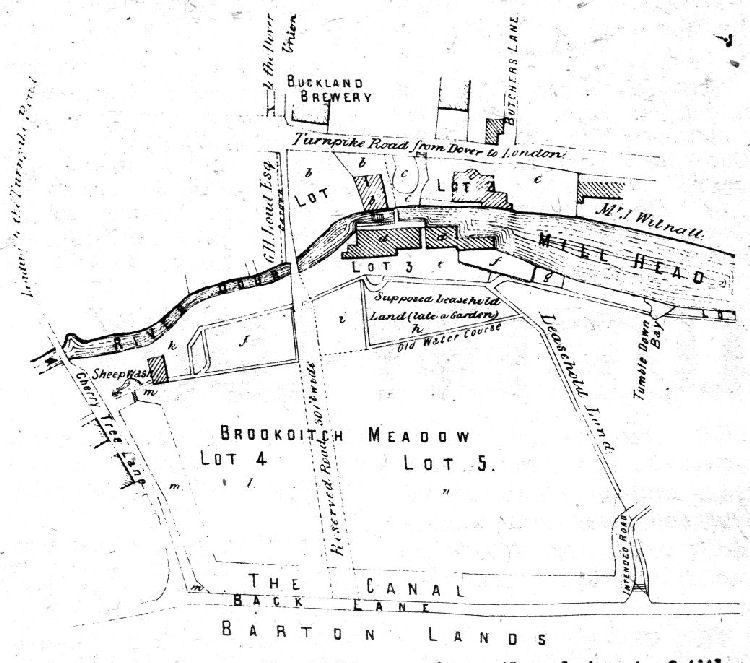 |
|
An interesting century-old map from the abstract of
title of the
trustees of the will of Dover brewer and miller Mr Alfred Kingsford,
who died on 11th December, 1878, to some of his property
between Barton Road and London Road. Buckland Brewery is
shown at the foot of Coombe Valley Road while the mill is on the
opposite side of London Road. The document was sent to the Dover
Express, by Mrs Dorothy Dale, of Lorne Road.
Information taken from John Bavington-Jones' book "A Perambulation of
the Town, Port and Fortress of Dover", 1906. (Reprint in The South Kent Gazette, April 8th
1981.) |
From the description it appeared that from the brewery wall down to Erith
Place was a farmhouse and farmyard, which was then very ancient. The
farmhouse, occupied by Mr Finn, the steward, stood just where the Fountain
Inn (Sportsman) now is, and on a part of the site of Swiss Cottages there was a farm
labourer's cottage, and close to it, fronting the main road, was a large
barn, which was at that time demolished. There were other farm buildings in
the rear, surviving well into the 20th century, having their approach from
Union Road. The 130 acres of land then sold comprised the part known as
Chapel Mount, so named after the old lepers' chapel. The other land was that
later occupied by George Street, Erith Street and Victoria Street, and also
extending up the south side of the valley as far as the boundary of Poulton.
At the back of the farm there was a brickfield, then carried on by Mr John
Finnis, some remains of which used to be seen in front of Edgar Road, but it
has mostly been covered by the railway. A large part of the land in Buckland
Bottom, including the farmyard, was purchased by Mr George Hatton Loud. The
farmyard subsequently became an attractive garden owned by a Miss Loud.
Information taken from John Bavington-Jones' book "A Perambulation of
the Town, Port and Fortress of Dover", 1906. (Reprint in The Dover
Express, Friday 20th March, 1981.)
|
|
The area is now occupied by Kingsford Court Flats and below is a transcript
of Lt-Colonel J Kingsford-Carson (Ret'd) speech for the opening day of the
flats. (1989).
Your Worship, Lady Mayoress, Mr McCarthy, Ladies & Gentlemen.
May I thank first the HYDE HOUSING ASSOCIATION for giving me the
privilege of contributing in a small way towards this happy occasion.
We accepted this kind invitation with some trepidation - it was largely
through the efforts of Mrs MARY RILEY and Mrs JANICE WAIN that my wife & I
are here and delighted to be with you today.
Secondly, congratulations to those residents who must have spent
considerable time & effort researching this site at BUCKLAND ably assisted
by Bob Hollingsbee & Mr Harman I understand. For those not involved in this
exercise, please bear with me.
For several generations my family ran what was locally known as the
WINDMILL BREWERY founded precisely 160 years ago in 1829 by the first
FLAVIUS KINGSFORD. He occupied the site which included the windmill built
about 1798.
When my ancestor started up the BUCKLAND BREWERY in 1829 I can find no
reference to his sources of malting barley or hops. One would have expected
them to have come from local farms in Kent. He had a relative, a MALTSTER in
Canterbury who may have helped initially.
My Great-Great-Grandfather was born at ASH in Oct. 1761. His Father owned
the windmill there & for a time FLAVIUS had been a farmer & miller at
BULWARK HILL, so he was fully aware of 'wind-power' -- perhaps in this age
of pollution we might make more use of it & I was delighted to see in
yesterday's TELEGRAPH that the wind-power revolution was growing & the
CENTRE FOR ALTERNATIVE ENERGY was seeking 100 Welsh hill farmers in order to
construct wind driven generators - incidentally, the Danish firm who is
advising them is one I worked for over 17 yrs before finally retiring!
Recently I read in an old Railway Guidebook, that by 1862 my
Great-Grandfather ALFRED who had by then taken over, imported through the
port... 2,302,169 quarters of foreign barley and no less than 8,442 tons of
hops!
Since there were other breweries in Dover at the time, I can only
conclude that the good people of this Town must have had an almighty thirst!
(My Mother, born down the road at Charlton Place, once told me that she was
given small beer for breakfast as a child!)
In those days the windmill was used for pumping water & I understand that
one of the wells was discovered when this site was cleared in order to build
these flats. And in view of the quantities of barley & hops, persistently
its winch gear was used to haul stores to the upper level of the building.
(You may like to see an early watercolour picture I have brought down
today).
Regrettably, many years before arrived on the scene, my Grandfather had
sold this establishment and I have been unable to sample the product!
Some of the older members of my audience may recall "KENTS BEST" the
brews produced by Geo. Beer & Rigden at Faversham. My Grandfather, the 2nd
FLAVIUS, used to say that old George Beer drove up in his pony & trap one
day to negotiate the sale of the pubs - the sale went through & Grandfather
went off to his other brewery at LAYCOCK in Wiltshire before finally
retiring to Hill Crest, Evesham, where I spent some very happy years of my
childhood with him.
Undoubtedly my ancestors would highly approve of the purpose to which
this old site has been devoted today.
I think particularly of ALFRED KINGSFORD for not only did he build
"Woodside" at the bottom of Whitfield Hill, but as a fine Christian man,
greatly assisted during 1840 with the erection of the old SALEM BAPTIST
CHAPEL here in Dover. I notice that this fact was recorded as recently as
February, 1983 in your local press. (Incidentally, the Victorian brewing
families seem to have been extremely generous when it came to the building
of many places of worship; on occasions my wife & I attend EMMANUAL in South
Croydon, built as a result of the generosity of Miss WATNEY no less, of
Watney Coombe & Reid). You may draw whatever inferences you like!
Enough of family history.
In this country today, many enjoy a high material standard of living yet
others, including many pensioners, are far less fortunate.
I know from personal experience how difficult life can be after
retirement with the problems of adjustment to changed circumstances, both
mental as well as material.
During my lifetime the whole pattern of society has changed; no longer
have we the ability - nor in many cases the desire - to accommodate the
older members of our family within the close & intimate circle of our own
home, where in the past, the grandchildren grew up to respect old age, to
benefit from the experience & wisdom which the older folk could contribute
to their lives, and to learn consideration for those far less active than
themselves. (One has only to look at the horrific figures today of crimes
committed against the elderly, to appreciate what has happened in our
society.)
Fortunately on the other side of the coin, an Association such as HYDE
exists to meet the economic challenge faced by elderly people, home-owners
who having retired wish to retain their independence & pride in a place of
their own albeit within a secure & friendly environment - I find this a
tremendous achievement!
One sad reflection upon the times we live in. Only last week the National
press reported that no less than 4,000 'secure' homes for elderly people
remain unoccupied. There are folk who desperately wish to move but cannot
because of the state of the housing market; they are unable to dispose of
their present homes many of which could be occupied by those just starting
out in life.
This state of affairs calls into question the ability of the so-called
'market forces' to meet the needs of the old and the young within our
society.
May I conclude by wishing everyone who resides here, much happiness &
contentment.
In the future, may they recall today with satisfaction and I hope, with
gratitude to those who had the foresight to build KINGSFORD COURT.
Thank you once again for inviting us here today. |
